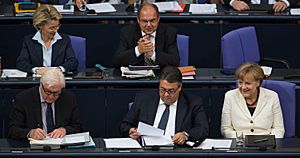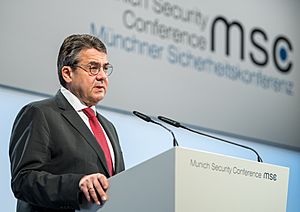Sigmar Gabriel facts for kids
Quick facts for kids
Sigmar Gabriel
|
|
|---|---|
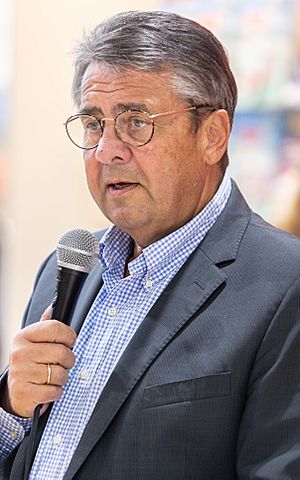
Gabriel in 2018
|
|
| Vice Chancellor of Germany | |
| In office 17 December 2013 – 14 March 2018 |
|
| Chancellor | Angela Merkel |
| Preceded by | Philipp Rösler |
| Succeeded by | Olaf Scholz |
| Leader of the Social Democratic Party | |
| In office 13 November 2009 – 19 March 2017 |
|
| Deputy | Olaf Scholz Hannelore Kraft Ralf Stegner Aydan Özoğuz Manuela Schwesig Thorsten Schäfer-Gümbel |
| Preceded by | Franz Müntefering |
| Succeeded by | Martin Schulz |
| Minister of Foreign Affairs | |
| In office 27 January 2017 – 14 March 2018 |
|
| Chancellor | Angela Merkel |
| Preceded by | Frank-Walter Steinmeier |
| Succeeded by | Heiko Maas |
| Minister of Economic Affairs and Energy | |
| In office 17 December 2013 – 27 January 2017 |
|
| Chancellor | Angela Merkel |
| Preceded by | Philipp Rösler (Economics and Technology) |
| Succeeded by | Brigitte Zypries |
| Minister of the Environment, Nature Conservation and Nuclear Safety | |
| In office 22 November 2005 – 27 October 2009 |
|
| Chancellor | Angela Merkel |
| Preceded by | Jürgen Trittin |
| Succeeded by | Norbert Röttgen |
| Minister-President of Lower Saxony | |
| In office 15 December 1999 – 4 March 2003 |
|
| Deputy | Heidrun Merk Renate Jürgens-Pieper |
| Preceded by | Gerhard Glogowski |
| Succeeded by | Christian Wulff |
| Leader of the Social Democratic Party of Germany in the Landtag of Lower Saxony | |
| In office 4 March 2003 – 9 November 2005 |
|
| Preceded by | Axel Plaue |
| Succeeded by | Wolfgang Jüttner |
| In office 30 March 1998 – 15 December 1999 |
|
| Preceded by | Heinrich Aller |
| Succeeded by | Axel Plaue |
| Member of the Bundestag for Salzgitter – Wolfenbüttel |
|
| In office 18 October 2005 – 3 November 2019 |
|
| Preceded by | Wilhelm Schmidt |
| Succeeded by | Markus Paschke |
| Member of the Landtag of Lower Saxony for Goslar |
|
| In office 21 June 1990 – 9 November 2004 |
|
| Preceded by | Jürgen Sikora |
| Succeeded by | Petra Emmerich-Kopatsch |
| Personal details | |
| Born |
Sigmar Hartmut Gabriel
12 September 1959 Goslar, Lower Saxony, West Germany |
| Political party | Social Democratic Party |
| Spouses |
Munise Demirel
(m. 1989; div. 1998)Anke Stadler
(m. 2012) |
| Children | 3 |
| Alma mater | University of Göttingen |
| Signature |  |
| Military service | |
| Allegiance | |
| Branch/service | |
| Years of service | 1979–1981 |
| Unit | |
Sigmar Hartmut Gabriel (born 12 September 1959) is a German politician who held important jobs in the German government. He was the Vice Chancellor of Germany from 2013 to 2018. He also served as the Minister for Foreign Affairs from 2017 to 2018.
Before these roles, he was the leader of the Social Democratic Party of Germany (SPD) from 2009 to 2017. This made him one of the longest-serving leaders of the party. He was also the Minister of the Environment from 2005 to 2009. From 2013 to 2017, he was the Minister for Economic Affairs and Energy. Earlier in his career, from 1999 to 2003, Gabriel was the Minister-President of Lower Saxony, which is like being the governor of a German state.
He represented the area of Salzgitter – Wolfenbüttel in the Bundestag, which is the German parliament.
Contents
Early Life and Education
Sigmar Gabriel was born in Goslar, West Germany, on September 12, 1959. His father, Walter Gabriel, was a civil servant, and his mother, Antonie Gabriel, was a nurse. His parents divorced when he was young.
His parents came to West Germany as refugees after World War II. His father was from a region that is now in Poland, and his mother was from a region that is now in Poland. Sigmar Gabriel has said that his family's history was difficult due to the war.
Gabriel went to school in Goslar. He served as a soldier in the German Air Force from 1979 to 1981. After his military service, he studied politics, sociology, and German at the University of Göttingen. He completed his studies to become a grammar school teacher in 1989.
Political Career
Gabriel joined the SPD political party in 1977. He quickly took on different roles in local politics. In 1990, he was first elected to the State Parliament of Lower Saxony. He became the leader of the SPD group in that parliament from 1998 to 1999.
Minister-President of Lower Saxony (1999–2003)
On December 15, 1999, Sigmar Gabriel became the Minister-President of Lower Saxony. This happened after the previous Minister-President, Gerhard Glogowski, stepped down. Gabriel served in this role until March 4, 2003. During this time, many people saw him as a rising star in politics.
After his time as Minister-President, Gabriel took on a unique role for the SPD. He was the party's "Representative for Pop Culture and Pop Discourse" from 2003 to 2005. This led to him being nicknamed Siggi Pop.
Federal Minister for the Environment (2005–2009)
In the 2005 German federal election, Gabriel was elected to the Bundestag for the Salzgitter – Wolfenbüttel area.
From 2005 to 2009, he served as the Federal Minister for the Environment, Nature Conservation and Nuclear Safety. He was part of the first government led by Angela Merkel.
During his time as Environment Minister, Gabriel supported the creation of the International Renewable Energy Agency. He also led Germany's group at the 2006 United Nations Climate Change Conference. In 2007, when Germany was in charge of the Council of the European Union, he helped lead talks among European environment ministers. These talks aimed to reduce greenhouse gases by 20 percent below 1990 levels. He also visited Greenland with Angela Merkel to see the effects of global warming firsthand.
Leader of the Opposition (2009–2013)
After the SPD lost the 2009 German federal election, Franz Müntefering resigned as the party chairman. Sigmar Gabriel was chosen to take his place and was elected on November 13, 2009. He was re-elected as party chairman in 2011.
As chairman, Gabriel made changes to how the party worked. He also helped start the Progressive Alliance in 2013. He had concerns about some groups being part of the Socialist International that were not democratic.
For the 2013 German federal election, Gabriel was considered as a possible candidate to become Chancellor. However, he and other party leaders decided to nominate Peer Steinbrück instead. During the election campaign, Gabriel spoke at a meeting of the Alliance '90/The Greens party. He called for a partnership between the SPD and the Greens to win the elections.
Vice-Chancellor and Federal Minister (2013–2018)
In 2013, after the SPD lost the 2013 German federal election, Gabriel helped the party join a new government with Angela Merkel's party. He successfully led the talks to form this new government. Many people thought he did a great job, especially since his party had fewer votes than Merkel's.
Gabriel became the Vice-Chancellor of Germany in the government led by Angela Merkel. He also took on the important job of leading the newly formed Economy Ministry. This ministry was in charge of Germany's energy overhaul, which means changing how Germany gets its energy.
As Minister of the Economy in 2014, Gabriel tried to control the export of German defense equipment.
In January 2017, Gabriel announced that he would not run for Chancellor in the upcoming election. Instead, he suggested that Martin Schulz should be the candidate and take over as party chairman.
Gabriel also announced that he would become the Minister for Foreign Affairs, replacing Frank-Walter Steinmeier. He started this new role on January 27, 2017.
As Foreign Minister, Gabriel spoke at the Munich Security Conference in February 2017. He suggested that NATO countries should focus more on the "root causes of conflict," like poverty and climate change, not just traditional defense. He also said that Germany would continue to work with the United States. However, he also stated that Germany would take on a bigger role on the international stage if the US pursued policies that isolated itself.
Life After Politics
After leaving public office, Sigmar Gabriel has taken on various roles.
In 2018, he was nominated to join the board of Siemens Alstom, a planned merger of two railway companies. However, the merger did not happen. In 2019, he turned down an offer to lead the German Association of the Automotive Industry (VDA) after public criticism.
Since leaving politics, Gabriel has been involved with several organizations. He became the chairman of the Atlantic Bridge and a member of the Trilateral Commission. He has also been a member of the Board of Trustees of the International Crisis Group since May 2018. In 2018, he was a visiting lecturer at Harvard University. Since November 2019, he has worked as a political consultant for Eurasia Group. In May 2020, Gabriel was elected to the supervisory board of Deutsche Bank.
Since 2020, the German-Israeli Future Forum Foundation has run a fellowship program under Gabriel's support.
Other Activities
Sigmar Gabriel has been involved in many other activities, including:
Corporate Boards
- Rheinmetall, Member of the Supervisory Board (since 2025)
- Heristo, Member of the Supervisory Board (since 2023)
- Bosch, Member of the International Advisory Committee (since 2022)
- Thyssenkrupp Steel Europe, Chair of the Supervisory Board (since 2022)
- Siemens Energy, Member of the supervisory board (since 2020)
- Deutsche Bank, Member of the supervisory board (since 2020)
- Eurasia Group, Senior Advisor (since 2019)
- Deloitte Germany, Member of the advisory board (since 2019)
- KfW, Member of the Board of Supervisory Directors (2013-2018)
- Volkswagen, Member of the supervisory board (1999-2003)
Non-profits
- Peace of Westphalia Prize, Member of the Jury (since 2022)
- Bonner Akademie für Forschung und Lehre praktischer Politik (BAPP), Member of the Board of Trustees (since 2009)
- German Association for Small and Medium-Sized Businesses (BVMW), Member of the Political Advisory Board (since 2018)
- European Council on Foreign Relations (ECFR), Member (since 2018)
- International Crisis Group, Member of the Board of Trustees (since 2018)
- Trilateral Commission, Member of the European Group (since 2018)
- Deutsche Nationalstiftung, Member of the Senate
- Friedrich Ebert Foundation (FES), Member
- World Economic Forum (WEF), Member of the Global Future Council on Geopolitics (2018-2019)
- Aktion Deutschland Hilft (Germany's Relief Coalition), Member of the Board of Trustees (2017-2018)
- Friedrich Ebert Foundation, Deputy Chairman (2005–2009)
- German Energy Agency (DENA), Member of the supervisory board (2005–2009)
- Max Planck Institute of Experimental Medicine, Member of the Board of Trustees (2005–2009)
- IG Metall, Member
- Lions Club, Member
Political Views
Foreign Policy
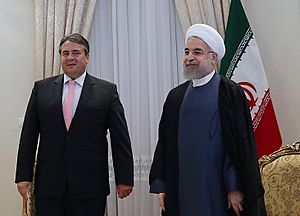
Gabriel has often spoken about Germany's role in the world. In 2010, he called for a review of Germany's military involvement in Afghanistan. He voted to extend Germany's participation in the NATO-led mission there in several years.
In 2008, Gabriel took part in a joint meeting of the German and Israeli governments in Jerusalem. In 2012, after visiting Hebron and the Palestinian territories, he said that Palestinians in those areas faced unfair treatment.
Gabriel was the first high-level German government official to visit Iran in 13 years in 2015. This visit happened shortly after Iran reached an agreement on its nuclear program. He met with Iranian leaders to discuss trade and other matters.
Regarding the conflict in Ukraine, Gabriel suggested in 2014 that a federal system could help solve the problems. He also said that Germany wanted to help resolve the conflict without harming Russia too much. In 2015, he visited a refugee camp in Jordan to learn about the struggles of Syrians fleeing the war. He also publicly urged Saudi Arabia to stop supporting religious groups that promote extreme views.
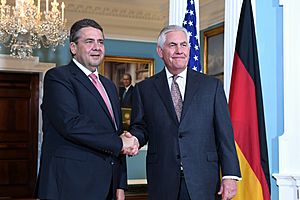
In 2016, Gabriel participated in a joint meeting of the German and Turkish governments. Later that year, he said that Turkey joining the European Union soon was unlikely.
After the G7 summit in 2017, Gabriel said that the United States, under President Donald Trump, had "weakened" the Western alliance. He suggested that Europe needed to take more control of its own future.
In June 2017, Gabriel criticized new US sanctions against Russia that could affect energy projects between the EU and Russia. He stated that Europe's energy supply is a matter for Europe, not the United States.
Gabriel supports the Campaign for the Establishment of a United Nations Parliamentary Assembly. This organization wants to make the United Nations more democratic. He believes the UN needs to be "more effective, transparent, and democratic."
In February 2018, Gabriel said that Russia and China were trying to "undermine" the liberal world order. He warned against attempts to divide the European Union. In March 2018, after leaving his role as Foreign Minister, Gabriel wrote about the future of relations between Turkey and the West. He argued for an inclusive approach towards Turkey. In February 2020, he joined other European leaders in signing a letter criticizing a Middle East peace plan. They said it could create an unfair situation in Palestinian territory.
Economic Policy
Gabriel has also spoken about economic issues. In 2011, he suggested a "new deal" for economic growth with other European leaders. They also proposed a tax on financial transactions.
In 2014, Gabriel said that special rules for protecting investments were not needed in a trade agreement between the EU and the US. He later called for a public court to handle trade disputes instead of private arbitration. He also warned against having too high expectations for economic benefits from trade agreements. By August 2016, Gabriel said that talks on a major trade agreement with the US had "de facto" failed.
In September 2014, Gabriel rejected a clause in a trade agreement between Canada and the European Union that dealt with investor disputes. This led to new negotiations for the agreement.
In 2014, Gabriel met with French economist Thomas Piketty, who suggested a tax on wealth. Gabriel disagreed, saying such a tax would not generate much money and would be "crazy" for businesses.
Together with French Minister Emmanuel Macron, Gabriel proposed in 2015 to create a common budget for the eurozone countries.
Energy Policy
After the Fukushima Daiichi nuclear disaster in 2011, Gabriel strongly criticized the International Atomic Energy Agency. He said it had promoted building nuclear plants in dangerous areas, and that this needed to stop.
In 2015, Gabriel opposed a plan for regional power markets in Europe. He argued that a free market with an emergency reserve would be cheaper and work just as well. He also warned against stopping coal-fired power generation too quickly. He was concerned it could put more pressure on energy producers who were already dealing with the planned shutdown of nuclear plants by 2022.
Arms Exports
When he became Federal Minister of Economic Affairs and Energy, Gabriel promised to be much more careful about allowing arms exports. This worried the defense industry. In August 2014, he stopped permission for a German company to build a military training center in Russia.
Gabriel was committed to reducing arms sales to countries that violate human rights or where such sales could cause instability. He said that controls over where small arms ended up were not good enough. However, he also said that the government would not block all deals with countries outside Germany's traditional allies. Deals could be approved if they had "special foreign-policy or security interests."
Digital Policy
In May 2014, Gabriel and France's economy minister criticized a settlement in an investigation into Google. Gabriel later welcomed the start of EU antitrust charges against Google in April 2015.
In September 2014, Gabriel called companies like Google, Amazon.com, and Apple Inc. "anti-social" for avoiding proper taxation. In early 2015, Gabriel and his French counterpart wrote a letter suggesting a new regulatory framework for large online platforms.
In 2016, during a time when Chinese companies were trying to buy German engineering firms, Gabriel called for a European rule. This rule would allow stopping foreign takeovers of companies whose technology is important for Europe's future economy.
Human Rights
In April 2014, human rights lawyer Mo Shaoping was prevented from meeting Gabriel during his visit to China. This happened even though Gabriel had said he wanted to meet people who held critical views.
During a 2015 visit to King Salman of Saudi Arabia, Gabriel publicly asked Saudi authorities to free an imprisoned writer, Raif Badawi. This was unusual for a Western leader visiting the country. He had been urged by politicians and human rights groups to bring up Badawi's case.
During a trip to Qatar, Gabriel also urged the emir of Qatar to better protect foreign workers who face abuse.
Personal Life
Sigmar Gabriel has three daughters. His first daughter, Saskia, was born in 1989. He was married to Munise Demirel from 1989 to 1998. In 2012, he married Anke Stadler, a dentist. Their daughter Marie was born in 2012, and their daughter Thea was born in 2017.
In December 2016, Gabriel had surgery to help manage his diabetes.
See also
 In Spanish: Sigmar Gabriel para niños
In Spanish: Sigmar Gabriel para niños
- List of foreign ministers in 2017
- List of current foreign ministers
 | Mary Eliza Mahoney |
 | Susie King Taylor |
 | Ida Gray |
 | Eliza Ann Grier |


